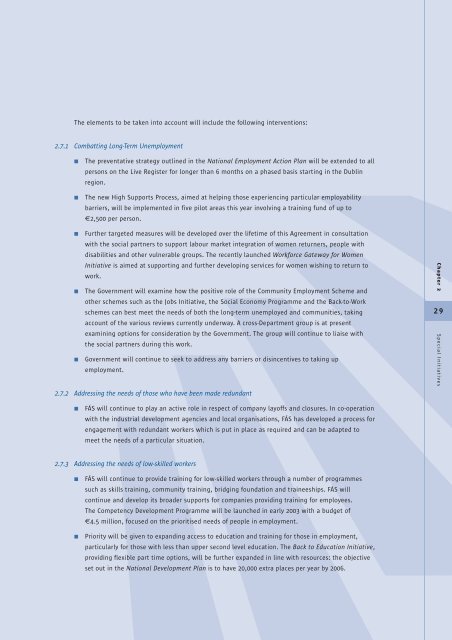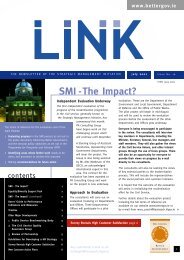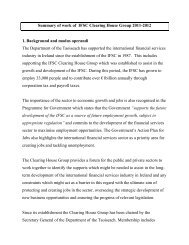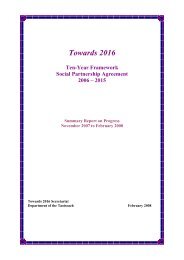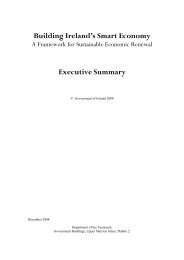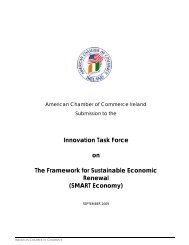Sustaining Progress - Department of Taoiseach
Sustaining Progress - Department of Taoiseach
Sustaining Progress - Department of Taoiseach
Create successful ePaper yourself
Turn your PDF publications into a flip-book with our unique Google optimized e-Paper software.
The elements to be taken into account will include the following interventions:<br />
2.7.1 Combatting Long-Term Unemployment<br />
■ The preventative strategy outlined in the National Employment Action Plan will be extended to all<br />
persons on the Live Register for longer than 6 months on a phased basis starting in the Dublin<br />
region.<br />
■ The new High Supports Process, aimed at helping those experiencing particular employability<br />
barriers, will be implemented in five pilot areas this year involving a training fund <strong>of</strong> up to<br />
€2,500 per person.<br />
■ Further targeted measures will be developed over the lifetime <strong>of</strong> this Agreement in consultation<br />
with the social partners to support labour market integration <strong>of</strong> women returners, people with<br />
disabilities and other vulnerable groups. The recently launched Workforce Gateway for Women<br />
Initiative is aimed at supporting and further developing services for women wishing to return to<br />
work.<br />
■ The Government will examine how the positive role <strong>of</strong> the Community Employment Scheme and<br />
other schemes such as the Jobs Initiative, the Social Economy Programme and the Back-to-Work<br />
schemes can best meet the needs <strong>of</strong> both the long-term unemployed and communities, taking<br />
account <strong>of</strong> the various reviews currently underway. A cross-<strong>Department</strong> group is at present<br />
examining options for consideration by the Government. The group will continue to liaise with<br />
the social partners during this work.<br />
■ Government will continue to seek to address any barriers or disincentives to taking up<br />
employment.<br />
2.7.2 Addressing the needs <strong>of</strong> those who have been made redundant<br />
■ FÁS will continue to play an active role in respect <strong>of</strong> company lay<strong>of</strong>fs and closures. In co-operation<br />
with the industrial development agencies and local organisations, FÁS has developed a process for<br />
engagement with redundant workers which is put in place as required and can be adapted to<br />
meet the needs <strong>of</strong> a particular situation.<br />
2.7.3 Addressing the needs <strong>of</strong> low-skilled workers<br />
■ FÁS will continue to provide training for low-skilled workers through a number <strong>of</strong> programmes<br />
such as skills training, community training, bridging foundation and traineeships. FÁS will<br />
continue and develop its broader supports for companies providing training for employees.<br />
The Competency Development Programme will be launched in early 2003 with a budget <strong>of</strong><br />
€4.5 million, focused on the prioritised needs <strong>of</strong> people in employment.<br />
■ Priority will be given to expanding access to education and training for those in employment,<br />
particularly for those with less than upper second level education. The Back to Education Initiative,<br />
providing flexible part time options, will be further expanded in line with resources: the objective<br />
set out in the National Development Plan is to have 20,000 extra places per year by 2006.<br />
Chapter 2 Special Initiatives<br />
29


